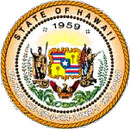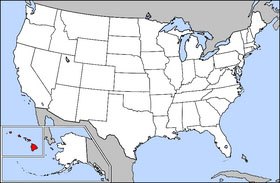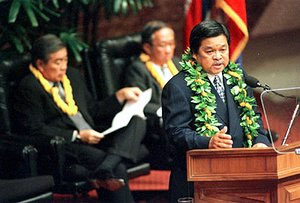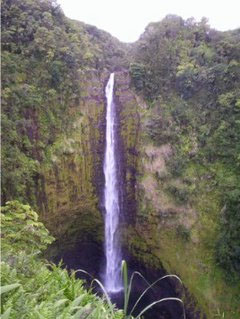Hawaiian Hometowns
Select your town below for the fastest way to Community Information. If your hometown isn't listed, please let us know by filling out this short form.Hawaii
 Hawaii State Flag |
 Hawaii State Seal |
 Hawaii Location |
Hawaii
Hawaii (Hawaiian/Hawaiian English: Hawai‘i, with the ‘okina) is the archipelago of the Hawaiian Islands in the Pacific Ocean. Hawaii constitutes the 50th state of the United States, and as of the 2000 U.S. Census had a population of 1,211,537 people. Honolulu is the largest city and the state capital.
Hawaii, the state most recently admitted into the Union, has many distinctions. In addition to having the southernmost point in the United States, it is the only state that lies completely in the tropics. As one of two states outside the contiguous United States, it is the only one without territory on the mainland of any continent and is the only state that continues to grow due to active lava flows, most notably from Kilauea. Ethnically, it is one of only two states that do not have a Caucasian majority and has the largest percentage of Asians. Ecologically and agriculturally, it is the endangered species capital of the world and is the only industrial producer of coffee in the nation.
Hawaiian Geography
The state is comprised of nineteen major islands and atolls in the Central Pacific Ocean. The government also includes within its territoriality minor offshore islands and individual islets found in each atoll in its official count of 137 islands. The inhabited islands are those that lie between Ni‘ihau and the Big Island of Hawai‘i, but the island chain extends another 1000 miles (1600 kilometers) to the northwest.
The most important cities and towns Hilo, Lihu‘e, and Wailuku, as well as the largest city and state capital, Honolulu.
All of the islands were formed by volcanic activity; current volcanic activity is limited to the Island of Hawai‘i. The last volcanic eruption elsewhere in the archipelago was on the southwest flank of East Maui Volcano, near the end of the 18th Century.
Hawaiian Languages
 The state of Hawai‘i has two official languages as prescribed by the Constitution of Hawai‘i adopted at the 1978 constitutional convention: Hawaiian and English. Article XV, Section 4 requires the use of Hawaiian in official state business such as public acts, documents, laws and transactions. Standard Hawaiian English, a subset of American English, is also commonly used for other formal business.
The state of Hawai‘i has two official languages as prescribed by the Constitution of Hawai‘i adopted at the 1978 constitutional convention: Hawaiian and English. Article XV, Section 4 requires the use of Hawaiian in official state business such as public acts, documents, laws and transactions. Standard Hawaiian English, a subset of American English, is also commonly used for other formal business.
Hawaiian History
Hawaiian history can be divided into the following episodes: ancient Hawai‘i under the rule of local chiefdoms; consolidation and establishment of the Kingdom of Hawai‘i; overthrow of the monarchy by the Provisional Government of Hawai‘i, followed by governance as the Republic of Hawai‘i; from 1898 to 1959, governance as the Territory of Hawai‘i; Hawai‘i becomes the State of Hawaii of the United States in 1959.
Hawaiian Government
The state government of Hawaii is modeled after the federal government with adaptations originating from the kingdom era of Hawaiian history. As codified in the Constitution of Hawai‘i, there are three branches of government: executive, legislative and judicial. The executive branch is led by the state governor who oversees the major agencies and departments. The legislative body consists of the 25-member Hawai‘i State Senate and the 51-member Hawai‘i State House of Representatives. The judicial branch is led by the highest state court, the Hawai‘i State Supreme Court. Lower courts are organized as the Hawai‘i State Judiciary.
Hawaiian Economy
The total gross output for the state in 1999 was USD $41 billion, placing Hawaii 40th compared to the other states. Per capita income for Hawaii residents was USD $28,221.
Historically, Hawaii is known for having a high amount of state taxes per capita. In 2002 and 2003, it had the highest amount of state taxes per capita, with $2,757 and $2,838 in state taxes per capita respectively. This can partly be explained by the fact that some services such as education, health care, and social services, are rendered at the state level, as opposed to the local level as in many states. Also, hundreds of thousands of tourists contribute to the figure by paying Hawaii's general excise and hotel room taxes. However, many business leaders in the state still consider Hawaii's tax burden to be too high.
Hawaiian Media
 Two major competing Honolulu-based newspapers serve all of Hawai‘i. The Honolulu Advertiser is owned by Gannett Pacific Corporation while the Honolulu Star-Bulletin is owned by Black Press of British Columbia in Canada. Both are two of the largest newspapers in the United States, in terms of circulation. Other locally published newspapers are available to residents of the various islands. The Hawai‘i business community is served by the Pacific Business News and Hawai‘i Business Magazine. The largest religious community in Hawai‘i is served by the Hawai‘i Catholic Herald. Honolulu Magazine is a popular magazine that offers local interest news and feature articles. Apart from the mainstream press, the state also enjoys a vibrant ethnic publication presence with newspapers for the Chinese, Filipino, Japanese, Korean and Native Hawaiian communities.
Two major competing Honolulu-based newspapers serve all of Hawai‘i. The Honolulu Advertiser is owned by Gannett Pacific Corporation while the Honolulu Star-Bulletin is owned by Black Press of British Columbia in Canada. Both are two of the largest newspapers in the United States, in terms of circulation. Other locally published newspapers are available to residents of the various islands. The Hawai‘i business community is served by the Pacific Business News and Hawai‘i Business Magazine. The largest religious community in Hawai‘i is served by the Hawai‘i Catholic Herald. Honolulu Magazine is a popular magazine that offers local interest news and feature articles. Apart from the mainstream press, the state also enjoys a vibrant ethnic publication presence with newspapers for the Chinese, Filipino, Japanese, Korean and Native Hawaiian communities.
Hawaiian Education
Hawaii is currently the only state in the union with a unified school system statewide. (Similarly, the commonwealth of Puerto Rico also has a commonwealth-wide system.) It is also the oldest public education system west of the Mississippi River. Policy decisions are made by the fourteen-member state Board of Education, with thirteen members elected for four-year terms and one non-voting student member. The Board of Education sets statewide educational policy and hires the state superintendent of schools, who oversees the operations of the state Department of Education. The Department of Education is also divided into seven districts, four on O‘ahu and one for each of the other counties.
Hawaiian Demographics
The population of Hawaii (Hawai‘i) is approximately 1.2 million, while the de facto population is over 1.3 million due to military presence and tourists. O‘ahu is the most populous island, with a population of just under one million.
According to the 2000 Census, 6.6% of Hawaii's population identified themselves as Native Hawaiian, 24.3% were White or Caucasian, including Portuguese and 41.6% were Asian, including 0.1% Asian Indian, 4.7% Chinese, 14.1% Filipino, 16.7% Japanese, Okinawan, 1.9% Korean and 0.6%Vietnamese. 1.3% were other Pacific Islander which includes Tongan, Tahitian, Maori and Micronesian, and 21.4% described themselves as mixed (two or more races/ethnic groups). 1.8% were Black or African American and 0.3% were American Indian and Alaska Native.
Famous Hawaiians
- Benny Agbayani, professional baseball player
- Dan Akaka, first Native Hawaiian US Senator
- Akebono, sumo wrestler
- George Ariyoshi, first Japanese American governor
- Angela Perez Baraquio, Miss America 2001
- Hiram Bingham III, Connecticut politician and explorer
- Bernice Pauahi Bishop, princess and philanthropist
- Charles Reed Bishop, banker and philanthropist
- Tia Carrere, actress
- Steve Case, former Chairman and CEO of America Online
- Alexander Cartwright, father of American baseball
- Benjamin J. Cayetano, first Filipino American governor
- Father Damien, Catholic missionary
- James Dole, pineapple magnate
- Hiram Fong, first Chinese American US Senator
- Don Ho, entertainer
- Dan Inouye, first Japanese American US Senator
- Dwayne Johnson, professional wrestler and actor known as "The Rock"
Miscellaneous Hawaiian Information

- Hawaii, being one of the United States, is included in the North American Numbering Plan; its area code within that plan is 808. It is also one of only three U.S. states that do not observe Daylight Saving Time, and the only one of those three that does not use DST anywhere in its territory.
- ‘Iolani Palace, the only royal residence in the United States, was once the home of King Kalakaua and Queen Lili‘uokalani, the last monarchs of Hawai‘i. It is open to visitors.
More Info
These Community Websites are part of a network of over 33,000 represented within the Hometown USA Network of Communities. We rely upon and encourage all members of the community to participate in the development of these pages. So come on in and visit with us, see what our great communities have to offer and if you can't find what you are looking for, let us know by posting a question in our Community Forums so that a member of that hometown can reply to you or email you the answer.

